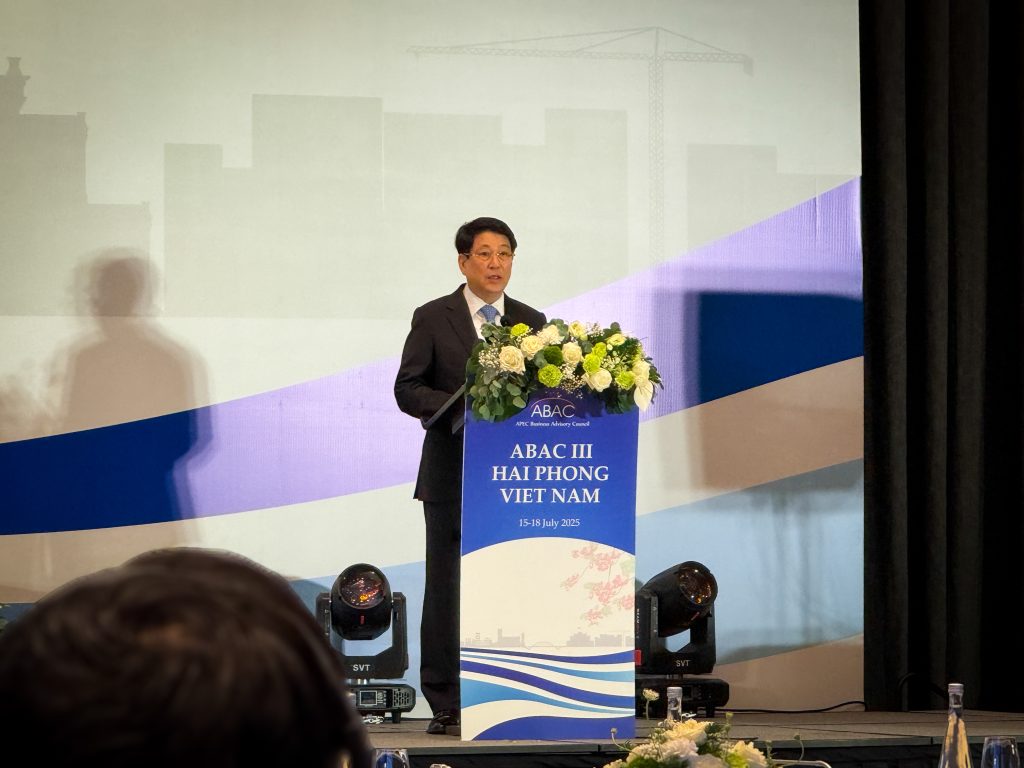
“People-centered, enterprise-driven, and sustainable development is the goal,” President of Viet Nam H.E. Lương Cường in the 3rd Meeting of APEC Business Advisory Council 2025

July 16, 2025 – At the opening of the Third Meeting of the APEC Business Advisory Council (ABAC) 2025, President of the Socialist Republic of Viet Nam, H.E. Lương Cường, formally addressed the Council and called for deeper regional cooperation to address growing risks to economic stability. He urged the business community to “strengthen cooperation, link production chains, share technology, [and] enhance adaptability to global shocks” (translated in English), framing private sector engagement as essential to the region’s ability to manage disruption and maintain growth.
President Cường emphasized APEC’s role in enabling economic coordination across economies, particularly as governments confront post-pandemic recovery challenges, climate impacts, and ongoing geopolitical shifts. “Efforts to adapt to climate change and restore supply chains require multilateral collaboration and public-private partnership” (translated in English), he underscored, calling for a higher level of cross-border alignment.
This call supports the direction advanced by ABAC Philippines through its member, Guillermo M. Luz, who presented and proposed a disaster resilience initiative under the Sustainability Working Group work plan during ABAC I in Brisbane in February 2025. The initiative, endorsed by the entire Council, will draw on private and public sector stakeholder insights to outline practical mechanisms for exchanging expertise between disaster-ready and high-risk economies. It positions the private sector as a core contributor to improving regional preparedness, strengthening response systems, and reducing long-term climate vulnerabilities among APEC communities. The work builds on the Philippines’ continued push for inclusive, risk-aware economic strategies across APEC.
President Cường also reinforced ABAC’s position as APEC’s official business advisory body, serving as a direct channel between the private sector and economic leaders. He noted that businesses are not only participants in growth but strategic partners in shaping solutions. He stressed the importance of adapting regulation with real-world conditions through sustained policy dialogue between the public and private sectors.
“Competition is necessary, but cooperation is the condition for all economies to succeed” (translated in English), President Cường said. He urged APEC economies to recalibrate growth strategies based on predictable rules, mutual benefit, and shared responsibility.
Reaffirming Vietnam’s commitment, the President expressed support for APEC initiatives that are “people-centered, enterprise-driven, and with sustainable development as the goal” (translated in English). He welcomed continued collaboration with ABAC to “develop and recommend practical policies that truly reflect the expectations and needs of the business community,” signaling Vietnam’s intent to align with business priorities while advancing regional stability.
At the conclusion of ABAC III in Hai Phong, ABAC officials are expected to finalize formal letters to APEC Ministers, endorsing key initiatives and principled recommendations in response to persistent economic, supply chain, technology, climate, and geopolitical challenges, ahead of the APEC Senior Officials’ Meeting 4 (SOM4) dialogue in Busan, Korea.
_______________________________________________________________________
APEC Member Economies: Australia; Brunei Darussalam; Canada; Chile; China; Hong Kong, China; Indonesia; Japan; Korea; Malaysia; Mexico; New Zealand; Papua New Guinea; Peru; Philippines; Russia; Singapore; Chinese Taipei; Thailand; United States of America; and Viet Nam.
ABAC was created by APEC Leaders in 1995 to be the primary voice of business in APEC. Each economy has three members who are appointed by their respective Leaders. They meet four times a year in preparation for the presentation of their recommendations to the Leaders in a dialogue that is a key event in the annual Leaders Meeting.
Under Korea’s leadership, ABAC is pursuing a work program under the theme “Bridge. Business. Beyond.” to respond to the challenge of maintaining the economic vitality of the Asia-Pacific Region and ensure it benefits all.
ABAC 2025 Chair is H.S. Cho (Korea) and the Co-Chairs are Julia Torreblanca (Peru) and (China), with five (5) working group chairs, namely: Anna Curzon, Regional Economic Integration Working Group (REIWG); Ning Gaoning, Sustainability Working Group (SWG); Michaela Browning, Finance and Economic Working Group (FEWG); Jan De Silva, AI and Digital Innovation Working Group (AIDIWG); and Kyuho Lee, Bio and Healthcare Working Group (BHWG).
For further information, please contact secretariat@abac.ph